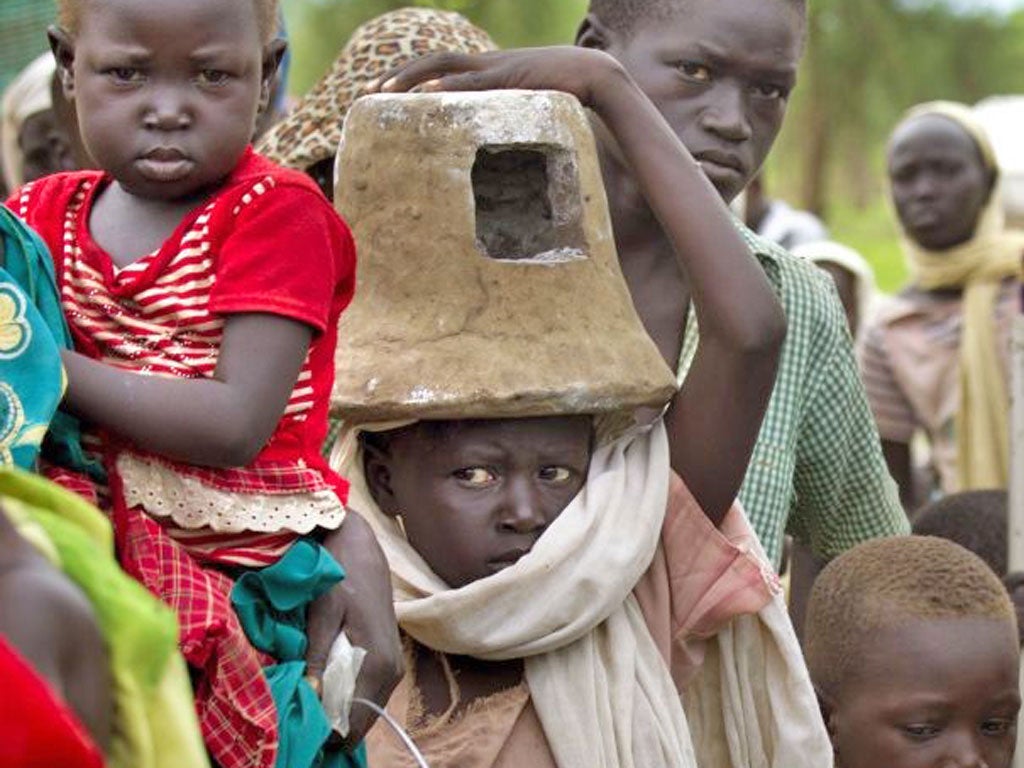New arrivals in South Sudan tell of worst war crimes since Darfur
Daniel Howden reports from the Batil refugee camps, where nine children a day are dying in flooded, crowded conditions

Your support helps us to tell the story
From reproductive rights to climate change to Big Tech, The Independent is on the ground when the story is developing. Whether it's investigating the financials of Elon Musk's pro-Trump PAC or producing our latest documentary, 'The A Word', which shines a light on the American women fighting for reproductive rights, we know how important it is to parse out the facts from the messaging.
At such a critical moment in US history, we need reporters on the ground. Your donation allows us to keep sending journalists to speak to both sides of the story.
The Independent is trusted by Americans across the entire political spectrum. And unlike many other quality news outlets, we choose not to lock Americans out of our reporting and analysis with paywalls. We believe quality journalism should be available to everyone, paid for by those who can afford it.
Your support makes all the difference.Idrissa Suleiman has watched bombs rain down on her home. She has been chased through the mountains of Blue Nile state in Sudan by helicopter gunships. The mother of two fled on foot from soldiers burning villages and massacring civilians. And she survived the "road of death" into neighbouring South Sudan, watching friends and relatives die of thirst and exhaustion.
Now, in a rain-soaked and crowded United Nations refugee camp in Upper Nile, she waits to see whether dirty water and diarrhoea will claim her son and daughter. Hassan, 2, bound against his mother in her brightly coloured shawl, has the sunken eyes and stick limbs of a toddler suffering his third bout of serious diarrhoea in recent weeks. Doctors were unsure if they would be able to save him.
Ms Suleiman, 28, is one of nearly 120,000 refugees who fled the fighting north of the border only to find themselves crowded into camps on an Upper Nile flood plain at the onset of rainy season. Serious flooding has already forced the partial evacuation of one of the three camps at Jamam. Plans to move the refugees by truck to another site, known as Batil, three hours away have been hindered by the flooding of areas of that camp as well.
"It's going to get worse," one aid worker said. "July is worse than June and August is going to be worse than July."
With tens of thousands of people living in sodden tents surrounded by contaminated floodwater, the number of deaths has risen to double the internationally recognised emergency rate. According to Médecins Sans Frontières (MSF), nine children are dying every day in the worst-affected camp at Jamam. The foetid water is ideal for mosquitoes to breed, and malaria cases have begun to appear. Conditions are also perfect for cholera and agencies have already built a quarantine facility in preparation for an outbreak.
Three waves of refugees have arrived in the camps, the first coming late last year when the government in Khartoum began a fierce counter-insurgency against former civil war foes in Blue Nile. Bombardment of civilian areas brought a second wave in February this year, and a third came in May after ground troops began a "scorched earth" offensive, burning villages and driving the population towards the border.
Testimony from Ms Suleiman and dozens of others who made the forced march tells of the worst war crimes seen in Sudan since Darfur more than eight years ago.
While earlier waves had faced treks of several weeks to reach the comparative safety of South Sudan, the final group – some 35,000 people – overwhelmed the UN refugee agency's inadequate preparations and had to be held back in border transit centres while aid agencies scrambled to prepare food, water and shelter at the already crowded camps.
The refugees, including another 50,000 at least in neighbouring Unity State who fled a similar conflict across the border in South Kordofan, are the clearest human example of what is at stake in negotiations between the two Sudans. The north-south conflict has continued despite the secession of South Sudan last year, and the former civil war foes face a 2 August deadline from the UN Security Council to resolve their border dispute.
The conflict defies the traditional narrative of an Arab and Muslim-dominated north at war with the predominantly Christian south. The Jamam camp's population is overwhelmingly Muslim.
The camp's community leader and leading sheikh, the Nazir Abode, accuses Khartoum of a campaign of ethnic cleansing to free land for its proxies and to silence complaints that electricity from a local hydro-electric plant is sent to Khartoum while most residents of Blue Nile remain without power.
"The only way back for us is if Bashir [Sudan's President, Omar al-Bashir] is arrested," the Nazir said. "What he has done in Darfur, he has done in Nuba Mountains, he has done in Blue Nile."
Join our commenting forum
Join thought-provoking conversations, follow other Independent readers and see their replies
Comments